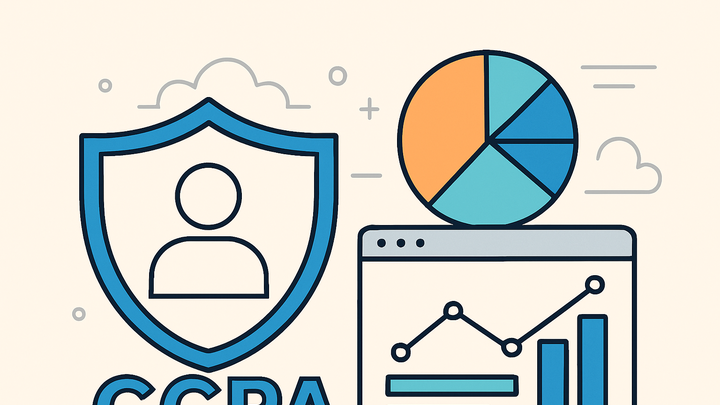Published on 2025-06-26T04:11:43Z
What is the CCPA? A Guide to the California Consumer Privacy Act in Analytics
The California Consumer Privacy Act (CCPA) is a landmark privacy law passed in 2018 designed to enhance privacy rights and consumer protection for residents of California. It grants individuals specific rights over their personal information, including the right to know what data is collected, the right to delete data, and the right to opt out of the sale of their personal information. For analytics professionals, CCPA introduces new requirements around transparency, data minimization, opt-out handling, and data deletion processes. Analytics platforms—from cookie-free tools like PlainSignal to industry giants like Google Analytics 4—must adapt their data collection and processing workflows to comply with these mandates, balancing insight needs with legal obligations. Noncompliance can result in significant financial penalties and reputational damage. This article explores the key provisions of CCPA, its impact on analytics implementations, and best practices for maintaining compliance.
Ccpa
CCPA is California’s data privacy law giving consumers rights over their personal data; it affects analytics via disclosure, opt-outs, and deletion workflows.
Overview of CCPA
The CCPA applies to for-profit businesses that collect personal information from California residents and meet certain thresholds. It defines key terms, establishes consumer rights, and sets enforcement standards.
-
Scope and applicability
CCPA applies to businesses meeting any of these criteria: over $25 million annual revenue, processing personal data of 50,000+ consumers, or deriving 50%+ revenue from selling personal data.
-
Business covered
For-profit entities doing business in California that meet one or more statutory thresholds.
-
Personal information defined
Any data that identifies, relates to, describes or could be linked to a consumer, such as IP addresses, cookies, and browsing history.
-
-
Consumer rights under ccpa
CCPA grants California residents several rights to control their data collected by businesses.
-
Right to know
Consumers can request disclosure of categories and specific pieces of personal data collected.
-
Right to delete
Consumers can request deletion of their personal information, subject to certain exceptions.
-
Right to opt-out
Consumers can opt out of the sale of their personal information to third parties.
-
Key Requirements for Analytics Platforms
Analytics solutions must support businesses in meeting CCPA obligations by enabling transparency, opt-out handling, and data deletion workflows.
-
Transparency and disclosures
Platforms should help surface clear privacy notices and assist with consumer data requests.
-
Privacy notice
Provide or link to a detailed privacy policy explaining data collection and processing practices.
-
Notice at collection
Inform users at the point of data collection about what categories of data are gathered and why.
-
-
Opt-out mechanisms
Analytics tools must respect and implement user opt-out preferences for data sales and tracking.
-
Do not sell my personal info link
Offer a standardized link or button for users to opt out of data sales.
-
Browser signals
Honor global privacy signals such as the Global Privacy Control (GPC) for automated opt-out.
-
-
Data deletion
Solutions must facilitate verification and deletion of personal data upon valid consumer request.
-
Verification process
Authenticate the identity of the requester before proceeding with data erasure.
-
Data erasure
Remove personal information from active databases and long-term backups.
-
Impact on Analytics Implementation
CCPA influences how data is collected, processed, and stored in analytics workflows, often driving shifts toward cookieless and privacy-first methods.
-
Cookie-free analytics with PlainSignal
PlainSignal’s cookieless approach minimizes CCPA compliance burdens by avoiding personal identifiers.
-
Implementation example
<link rel="preconnect" href="//eu.plainsignal.com/" crossorigin /> <script defer data-do="yourwebsitedomain.com" data-id="0GQV1xmtzQQ" data-api="//eu.plainsignal.com" src="//cdn.plainsignal.com/plainsignal-min.js"></script> -
Data privacy by design
No user-level identifiers are stored, reducing the scope of personal information processed.
-
-
Google analytics 4 (GA4)
GA4 includes built-in privacy features to help businesses comply with CCPA.
-
Ip anonymization
Automatically anonymizes user IP addresses before storage.
-
Data retention controls
Allows configuration of user and event data retention periods.
-
-
Consent management integration
Pairing analytics with a Consent Management Platform ensures tracking aligns with user preferences.
-
Banner configuration
Capture and store granular user consent choices.
-
Api hooks
Block or allow tracking scripts dynamically based on user consent.
-
Best Practices for CCPA Compliance in Analytics
Adopt ongoing processes and technical controls to ensure your analytics environment remains compliant.
-
Conduct regular data audits
Map and review all analytics data flows and personal information collected.
-
Inventory
Document data types, collection methods, and storage locations.
-
Risk assessment
Evaluate the privacy impact of each data element and flow.
-
-
Update privacy policies
Keep privacy notices current with your analytics practices and CCPA rights.
-
Clear language
Use plain, user-friendly descriptions of data uses.
-
Accessibility
Ensure policy links are prominently displayed and easy to find.
-
-
Provide user controls
Enable consumers to exercise their CCPA rights directly through your analytics interface.
-
Opt-out link
Implement a “Do Not Sell My Personal Information” button on your site.
-
Data deletion portal
Offer an online form or API for submission and tracking of deletion requests.
-
Enforcement and Consequences
Failure to comply with CCPA can result in enforcement actions, civil penalties, and private lawsuits.
-
Civil penalties
The California Attorney General may impose fines for non-compliance.
-
Penalty amounts
Up to \(2,500 per unintentional violation and \)7,500 per intentional violation.
-
-
Private right of action
Consumers can pursue statutory damages in the event of certain data breaches.
-
Statutory damages
Between \(100 and \)750 per incident, per consumer, without proof of actual harm.
-
-
Recent enforcement trends
Monitoring case law and regulatory guidance helps anticipate evolving requirements.
-
Notable settlements
High-profile cases highlight common pitfalls and enforcement priorities.
-
Regulatory updates
Stay informed about proposed amendments and expanded definitions under CCPA.
-
